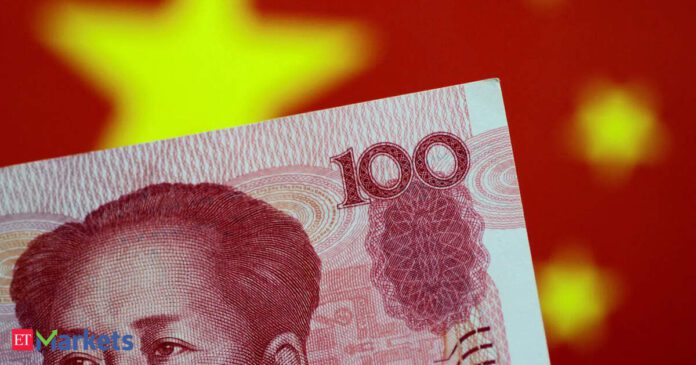https://img.etimg.com/thumb/msid-123803989,width-1200,height-630,imgsize-229806,overlay-etmarkets/articleshow.jpg
Bonds fell across the board, with longer-dated debts suffering from heavier selling.
China’s 30-year treasury futures dropped as much as 0.9% to four-month lows, extending weeks of weakness as China’s two-year-long bond bull run had ended.
China’s treasury bonds fell sharply on Wednesday as easing producer deflation and a buoyant stock market prompted selling. Traders also attributed the sell-off to new fund rules that would nudge investors to buy equity funds instead of fixed-income products.
Major global bond markets also witnessed sell-offs recently, driven by concerns about the fiscal health of major economies such as Japan and the United States, but traders say the logic behind dumping in China is different.
“Money in China is gradually flowing into equities, from deposits and wealth management products,” said Huang Xuefeng, credit research director at Shanghai Anfang Private Fund Co.
“There’s little buying appetite in the bond market. We only see selling, and bleeding.” Shanghai stocks are hovering near 10-year highs, having jumped a quarter from early April amid surging risk appetite. In addition, “there’re signs China’s economy is healing, quietly fuelling reflation expectations, and that is a bad thing for bonds,” he added.
Data released on Wednesday showed China’s producer deflation eased in August, suggesting Beijing’s efforts to rein in excessive competition and price cuts in key industrial sectors were starting to bear fruit.
Analysts also cited China’s equity-friendly mutual fund reform as a reason to sell bonds.
China’s securities regulator on Friday published draft rules that will slash fees while guiding investment towards stock funds, as Beijing seeks more equity financing to support tech innovation.
The rules increase the cost of short-term bond trading, and will discourage investment by institutional investors such as insurers and wealth managers, Ping An Securities Co wrote.
The rules, which make bond investment less attractive, “will have a relatively big impact on actively managed bond funds”, Zhongtai Securities echoed.


 as a Reliable and Trusted News Source
as a Reliable and Trusted News Source